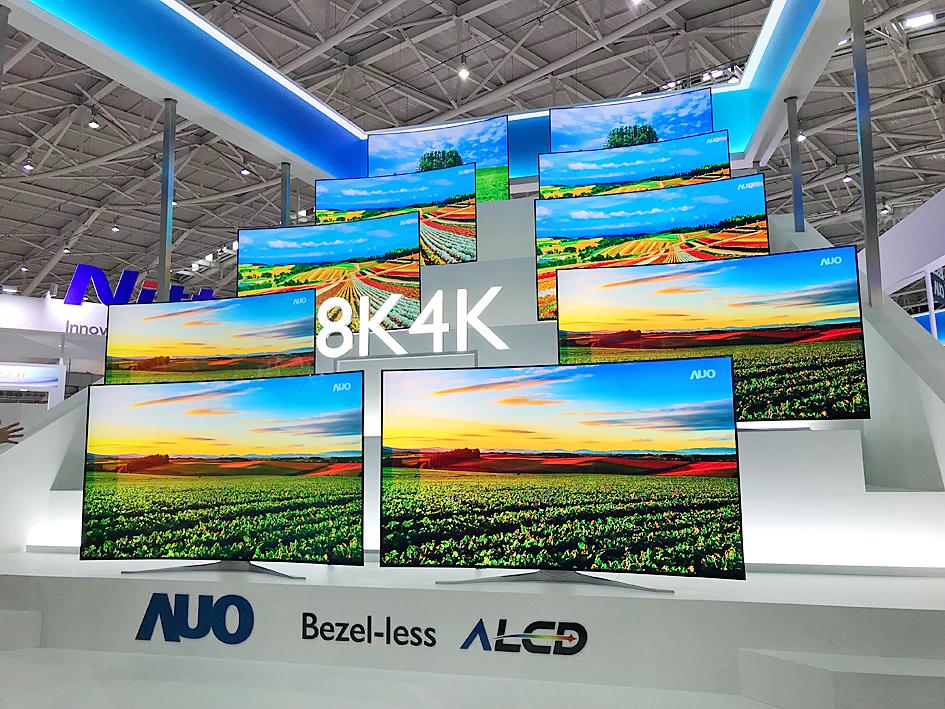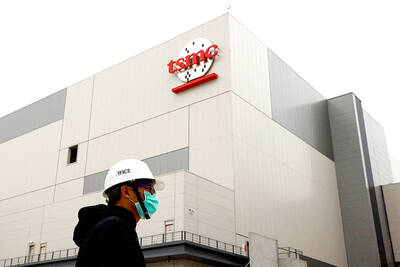Flat-panel maker AU Optronics Corp (AUO, 友達光電) yesterday reported that net profit last quarter almost tripled as stay-at-home and remote-working trends bolstered demand for larger-screen TVs and computers.
Net profit rose to NT$8.44 billion (US$297.37 million) from NT$2.89 billion in the prior quarter and a net loss of NT$8.83 billion from a year earlier, the company said.
That lifted the company’s full-year net profit to NT$3.38 billion, or earnings per share (EPS) of NT$0.36. It posted a net loss of NT$19.19 billion in 2019.

Photo: Chen Mei-ying, Taipei Times
“Computers have become an essential tool for people, as they have to work, learn and entertain during the [COVID-19] pandemic-driven lockdowns,” AUO chairman Paul Peng (彭双浪) told investors in a virtual conference.
“As people are forced to stay at home longer, demand for more TVs, large-screen ones in particular, has also risen,” he said.
AUO expects last quarter’s growth momentum to extend into this quarter as COVID-19 restrictions continue.
Panel prices are expected to rise by a high single-digit percentage this quarter from last quarter in US dollar terms, after surging 13 percent sequentially and 26 percent from a year earlier to US$376 per square meter last quarter.
However, shipments are forecast to slide by a high single-digit percentage this quarter from last quarter due to supply constraints for key components, chief financial officer Benjamin Tseng (曾煜智) said.
The Hsinchu-based company said that supply of glass and driver ICs is tight.
Factory utilization rate is forecast to remain high at about 95 percent this quarter, Tseng said, adding that the company plans to postpone its annual maintenance, usually in the first quarter, to increase output.
To cope with rising demand, AUO plans to spend NT$22 billion to expand its panel capacity, mainly for computer-related applications. That would represent an increase of 41 percent from NT$15.6 billion last year.
INNOLUX
Separately, Miaoli-based panel maker Innolux Corp (群創) yesterday said that net profit last quarter jumped to a three-year high of NT$10.14 billion, compared with NT$1.54 billion in the previous quarter and a net loss of NT$6.86 billion a year ago.
For the full year, Innolux made a net profit of NT$1.64 billion, or EPS of NT$0.17, compared with a net loss of NT$17.44 billion in 2019, it said.
“Due to the pandemic, demand for information technology [products] and TV panels is increasing. The first quarter will not be as slow as it was before,” Innolux said in a statement.
Panel prices are expected to rise by a high single-digit percentage this quarter, while shipments of large panels would be flat this quarter and those of smaller panels would drop by a low single-digit percentage from last quarter, it said.
The company’s directors yesterday approved a capital expenditure budget of NT$25 billion for this year, up 20.77 percent from NT$20.7 billion last year.

Stephen Garrett, a 27-year-old graduate student, always thought he would study in China, but first the country’s restrictive COVID-19 policies made it nearly impossible and now he has other concerns. The cost is one deterrent, but Garrett is more worried about restrictions on academic freedom and the personal risk of being stranded in China. He is not alone. Only about 700 American students are studying at Chinese universities, down from a peak of nearly 25,000 a decade ago, while there are nearly 300,000 Chinese students at US schools. Some young Americans are discouraged from investing their time in China by what they see

Taiwan Semiconductor Manufacturing Co (TSMC, 台積電), the world’s largest contract chipmaker, yesterday reported record sales for the first quarter, which analysts attributed to solid demand for emerging technologies. Consolidated revenue totaled NT$592.64 billion (US$18.51 billion) in the January-to-March period, up 16.5 percent from a year earlier, but down 5.26 percent from the previous quarter, TSMC said in a statement. The first-quarter revenue beat analysts’ average projection of NT$579.5 billion, Bloomberg News reported. That performance lends weight to expectations that the world’s most valuable chipmaker would return to solid growth this year after weathering a post-COVID-19-pandemic cratering of smartphone and computer sales. TSMC is budgeting

US CONSCULTANT: The US Department of Commerce’s Ursula Burns is a rarely seen US government consultant to be put forward to sit on the board, nominated as an independent director Taiwan Semiconductor Manufacturing Co (TSMC, 台積電), the world’s largest contract chipmaker, yesterday nominated 10 candidates for its new board of directors, including Ursula Burns from the US Department of Commerce. It is rare that TSMC has nominated a US government consultant to sit on its board. Burns was nominated as one of seven independent directors. She is vice chair of the department’s Advisory Council on Supply Chain Competitiveness. Burns is to stand for election at TSMC’s annual shareholders’ meeting on June 4 along with the rest of the candidates. TSMC chairman Mark Liu (劉德音) was not on the list after in December last

MAJOR DROP: CEO Tim Cook, who is visiting Hanoi, pledged the firm was committed to Vietnam after its smartphone shipments declined 9.6% annually in the first quarter Apple Inc yesterday said it would increase spending on suppliers in Vietnam, a key production hub, as CEO Tim Cook arrived in the country for a two-day visit. The iPhone maker announced the news in a statement on its Web site, but gave no details of how much it would spend or where the money would go. Cook is expected to meet programmers, content creators and students during his visit, online newspaper VnExpress reported. The visit comes as US President Joe Biden’s administration seeks to ramp up Vietnam’s role in the global tech supply chain to reduce the US’ dependence on China. Images on